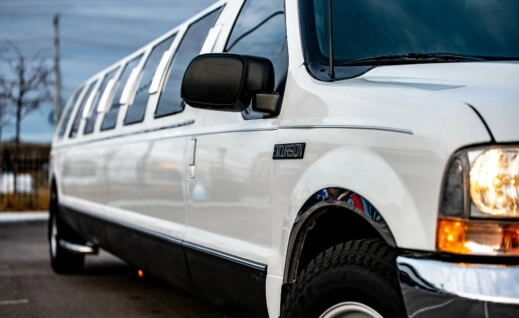Limousine Insurance
Limousine insurance protects your business from costly risks like accidents, lawsuits, and employee injuries. It’s essential for both solo drivers and fleet owners. With required coverages like commercial auto and workers’ comp, insurance keeps your limo service legally compliant and financially secure.
Choose the right coverage from trusted insurance providers.































Why Do Limo Businesses Need Insurance?

As someone who once managed a fleet of luxury vehicles, I’ve seen how crucial insurance is in the limo industry. If a chauffeur shows up late, the result could be more than just a bad review; it might lead to a lawsuit. In high-end transport, where passengers expect flawless service, even small mistakes can cost big.
That’s where business insurance steps in; it helps pay the legal costs if a dissatisfied client decides to sue. But it’s not just about client disputes. Accidents happen, and when they do, the right policies can cover auto accidents, injuries, damaged property, or even data breaches involving client information.
Some types of coverage, like auto insurance and workers’ comp, are even required by law. From my experience, investing in full coverage upfront saved us from financial disasters down the road. Insurance isn’t just a safety net; it’s a necessity in this line of work.
What types of insurance do you need for limousines?
These insurance policies cover common risks faced by limousine companies.
Business owner’s policy
This policy conveniently bundles commercial property and general liability insurance into one cost-effective plan for dealers. A BOP is ideal for securing auto shop insurance and shielding businesses from financial losses.
Under this plan
Customer injuries
Damaged customer vehicles
Damaged business property
Commercial umbrella insurance
A policy like this boosts coverage by increasing the limits of general liability insurance, commercial auto insurance, and employers’ liability insurance. It helps protect businesses from expensive lawsuits related to multi-vehicle auto accidents, customer injury lawsuits, and employee injury lawsuits.
Under this plan
Customer injury lawsuits
Employee injury lawsuits
Multi-vehicle auto accidents
Commercial auto insurance
A policy designed for dealers and repair shops helps pay for property damage and medical bills after an accident. It is required in many states for businesses that own cars.
Under this plan
Weather damage
Vandalism and theft
Car accident repair costs
Cyber insurance
A policy like this helps protect automotive businesses from financial loss after data breaches or cyberattacks. It’s recommended for any business that stores customer credit cards or other personal information.
Under this plan
Fraud monitoring services
Data breach investigations
Customer notification expenses
General liability insurance
Under this plan
Accidental vehicle damage
Customer injuries at a repair shop
Slander and other advertising injuries
Worker’s compensation insurance
Under this plan
Employee medical expenses
Partial wage reimbursement
Lawsuits over employee injuries
What Does Limo Insurance Really Cost?

As someone who’s helped limo and livery business owners for years, I’ve seen how important the right insurance is and how much it can vary. If you’re a driver who works independently, you can expect to pay less compared to a limousine business that has several employees. That’s because many factors affect the cost of business insurance.
To begin with, the types of services offered play a big role. For example, if you cater to weddings or corporate clients using luxury sedans, SUVs, or even buses, your risk level rises, so do your costs. The owner of the business must carefully calculate these variables.
Next, the number of employees and their driving records impact pricing. Clean records usually lead to lower premiums, while a bad claims history can push rates higher. When choosing a plan, the types of insurance purchased, policy limits, and deductibles also shape what you’ll actually pay. High limits and low deductibles offer better protection but cost more.
From my experience, many businesses underestimate how much their revenue and vehicles contribute to their rate. But every factor ties back to how an insurer calculates risk.
- The driver who works independently may pay less
- Bigger limo fleets with several employees cost more
- Luxury sedans, SUVs, and buses raise rates
- Good driving records and a low claims history help reduce costs
- The types of insurance purchased and policy limits matter
- High revenue and risky services offered push prices up
How to Get Limousine Insurance the Right Way
Getting limousine insurance doesn’t have to be complicated. From my experience helping many livery operators, the key is having your business info ready, especially details like your revenue and number of employees. Whether you’re a sole proprietor or run a company with a growing team, the process can be quick if you follow a few smart steps.
Most limo providers now make it simple. You can complete a free online application, compare insurance quotes, and choose a policy that fits your needs. After that, just pay for your policy and download a certificate—you’re good to go.
I often tell new limo business owners to look for licensed agents who partner with top-rated U.S. providers. These experts know how to match your specific risks to the right coverage, so you’re not overpaying or left exposed.
The right insurance gives peace of mind. It protects you whether you’re booking a single event or managing a fleet. And trust me, having that certificate of insurance in hand? It makes you look more professional to your clients, too.
Two ways to start your coverage

Quotes online

Talk to an agent
Verified business insurance reviews
Hear from customers like you who purchased small business insurance.
FAQs about Commercial Limo Insurance
In almost every state, vehicles owned by a business must carry commercial auto insurance. This policy should meet your state’s minimum coverage requirements for bodily injury liability and property damage liability. Some states also require personal injury protection (PIP) or uninsured/underinsured motorist coverage.
If you provide limo services or run a for-hire transportation business, additional rules may apply depending on your city, county, or local regulations. These requirements usually depend on:
- Where you operate
- The type of vehicle, such as a stretch limo or taxi cab
- The seating capacity of the vehicle
For instance, the New York City Taxi & Limousine Commission (TLC) enforces different minimum coverage amounts for luxury limos, black cars, and other for-hire vehicles based on their vehicle type and how many passengers they hold.
A small limo company with low risks can often pay less for insurance. Here are a few ways to keep your insurance costs manageable:
- Comparison shopping: Rates vary by insurance company, so fill out an online application to compare quotes before buying.
- Higher deductible: Increasing your deductible can reduce your premium, but make sure you can afford the deductible amount.
- Lower policy limits: Choosing lower policy limits can make the premium more affordable. However, ensure the coverage is still enough to handle a lawsuit.
- Annual payments: Paying annually may get you a discount compared to monthly payments.
- Avoiding unnecessary options: Don't pay for coverage you don’t need. For example, skipping comprehensive coverage for rare events like falling branches or animal collisions could reduce your insurance cost.
Just keep in mind, the cheapest policy isn’t always the smartest. One unexpected claim could harm your business if you’re not properly covered.
Top transportation fields we insure
Don't see your profession? Don't worry.
We insure most businesses.
